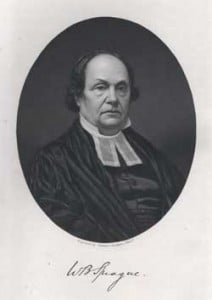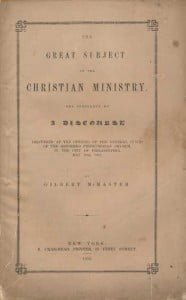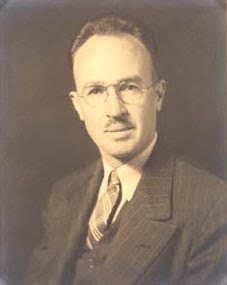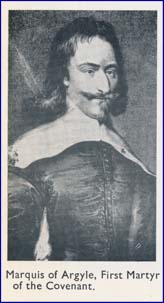 Sermons on the subject of heaven, at least those from a confessionally orthodox standpoint, seem to be rather rare. Our sermon for this Lord’s day is one of those rarities. It was delivered by the noted pastor and biographer, the Rev. William Buell Sprague, on February 9, 1845. The full title of the sermon, if you wish to make note of it, is A Sermon preached in the Second Presbyterian Church, Albany, February 9, 1845, the Sabbath immediately succeeding the Death of Mrs. Oliver S. Strong, of Jersey City, daughter of Archibald McIntyre, Esq. of Albany.
Sermons on the subject of heaven, at least those from a confessionally orthodox standpoint, seem to be rather rare. Our sermon for this Lord’s day is one of those rarities. It was delivered by the noted pastor and biographer, the Rev. William Buell Sprague, on February 9, 1845. The full title of the sermon, if you wish to make note of it, is A Sermon preached in the Second Presbyterian Church, Albany, February 9, 1845, the Sabbath immediately succeeding the Death of Mrs. Oliver S. Strong, of Jersey City, daughter of Archibald McIntyre, Esq. of Albany.
It may be worth noting that Sprague was trained for the ministry in the early days of Princeton Theological Seminary, studying under professors Archibald Alexander and Samuel Miller. Thus the content of his sermon may arguably be seen as a reflection of the Princeton theology.
SERMON.
PSALM xxxvi, 9.
In thy light shall we see light.
The natural state of man is a state of darkness. His vision is indeed clear enough for the discerning of natural objects; and the sun in the heavens pour his radiance around him, to delight his eye and to illuminate his path. So too he has the faculty of viewing the qualities of the ten thousand objects by which he is surrounded—of looking over the creation with the intellectual as well as the bodily eye—of admiring as well as beholding the beauty, and grandeur, and harmony, which pervade the works of God. And more than that—he has a certain kind of moral discernment, by which he sees the immutable distinction between right and wrong, and the unchanging obligation of man to yield obedience to his Creator, and the fearful recompense of transgression under a wise and righteous government. All the great truths, both of natural and revealed religion, are, in a certain sense, fairly within the scope of his vision; and he can speak of them, and speak of them honestly, with reverence and admiration.
But notwithstanding all this, the remark with which I began is true—emphatically true—that man is naturally in a state of darkness; else what means that declaration of the Apostle that “the natural man receiveth not the things of the Spirit of God, for they are foolishness unto him, neither can he know them, because they are spiritually discerned”? The truth is, that man, with the eye of his natural understanding, can look—if I may be allowed the expression—at the exterior of God’s truth; but he is incapable of penetrating beneath the surface. There is in it a depth of spiritual excellence and beauty—an adaptation to meet the inward cravings of the soul, and to exalt and glorify its all-wise Author, of which he has no knowledge. He has not penetrated into the sanctuary of experimental religion. He may talk even in rapture of the spiritual glory of the gospel, and may imagine that he has felt its power; but it is an imaginary experience, and nothing more. The true light has not shined into his soul; for the film that naturally obstructs his spiritual vision has not been cleared away.
But there have been those in every age, whom the Spirit, by his illuminating and all gracious energies, has brought out of darkness into marvellous light. Among these there have been not a few who had been accustomed to view divine truth before, with a strong intellectual vision; and what is more—men who had imagined that the true light had already found its way into their understandings; nay, who had ridiculed the idea of any other light than that which every man enjoys, in the diligent use of his natural powers. But these, as truly as others, have had their views corrected, and have acknowledged with the most grateful admiration of God’s grace, that “old things have passed away and all things have become new.”
I say then, the Christian, even in this imperfect state, sees light in God’s light. In the contemplation of his truth, as it is revealed in his word; in the experience of his grace, as it refreshes and elevates his soul; he walks in the light of the divine countenance. When he contemplates the glory of God’s providence, the glory of Redemption, the anticipated glory of Heaven,—especially when the eye of his faith fastens upon Christ, in whom dwells all the fullness of the Godhead, whose presence is the bliss, and whose praise is the employment of, the ransomed,—I say, when these wonderful subjects come before his mind, he seems to himself to be walking in an immeasurable field of light, and the illumination of the sun of righteousness well nigh entrance his soul with ecstacy. In the experience of Christians, the intense joys to which I have here referred, are by no means constant; and many perhaps may remain strangers to them through life; but all, all without exception, who have been born from above, have some new views of spiritual objects : if there is not the joy that is unspeakable and full of glory, there is ordinarily the peace that passeth understanding; and in every case there is a spiritual relish for God’s truth, which develops itself in earnest aspirations after Heaven, and which has in it the elements of heavenly glory.
But we may consider the text, in its ultimate bearing, as looking at the condition of the Christian in a future world rather than in the present; that world in which we are to “see face to face,” rather than this in which “we see through a glass darkly.” There are some beams of spiritual light that bring gladness to the Christian’s soul here; but there it will be light without shade; the sun of righteousness will shine forever in His glory without the intervention of a cloud. I know, my brethren, that our views of Heaven are at best exceedingly imperfect : there is a depth of meaning in the descriptions which inspiration has given of it, which it might defy even the seraph before the throne to fathom. It were in vain for us, for instance, to attempt to decide in what part of the universe will be the city of our God; or to form any adequate conception of that splendid garniture with which the Creator has adorned it. Conceive of a city which is of pure gold; the walls of which are of jasper, and its foundation of all manner of precious stones, and its gates of pearl, and its very streets transparent, so as to reflect every image of beauty and grandeur : conceive that it is illuminated by the presence of the Lord God Almighty and the Lamb; and that the nations of them that are saved walk in the light of it, and that the kings of the earth do bring their glory and honor into it; and then, if you can analyze this conception, and tell what is included in all this burning imagery, you have some idea of Heaven.
But instead of attempting to lead you into any general view of this sublime subject, I shall limit myself in the present discourse, to the simple thought suggested by our text—that in Heaven the glorified saint will behold light—light emanating directly from the fountain of all light. He will dwell in the immediate presence of the Lord God, who is the sun of the universe; and wherever He moves, He will move amidst a flood of divine illuminations.
Let us consider then, some of the CHARACTERISTICS of that light in which the Christian is hereafter to rejoice.
1. It is a spiritual light. We know too little of what will be the constitution of the glorified body, to be able to decide whether it will possess distinct organs of vision adapted to behold external objects, or whether the mind will act directly, as by a kind of intuitive survey, on the splendors of the renovated creation. But whether the one or the other be true, the glorified saint will behold light that will reveal to him all that is magnificent in the palace of the king of glory; all that is majestic in the throne on which the Redeemer sits, and around which angels sing; all that is attractive and enchanting in the fields and flowers and fruits of immortality. But that light which will be most enrapturing to the eye of the redeemed saint, no doubt will be the light of truth; that in which he will behold the same great truths on which his mind had been fastened here, illustrated and amplified into a field of glory. Here he had often been occupied in contemplating the character and government of God; the character and mediation of His Son; the love and grace and glory which are displayed in the scheme of redemption; the relations which that scheme may sustain to other worlds, and to the whole created universe : and there too the same truths will still be before his mind, and he will see them in a yet brighter light; and will discover in them endlessly diversified forms of moral and spiritual beauty. He will find in these truths a depth of wisdom, which here it had not entered his mind to conceive; and which, even with the vision of a seraph, he will never be able fully to explore. And other truths involved in these, or growing out of them, or independent of them, will not doubt unfold to his understanding, and engage his admiring scrutiny. It was in the light of truth that he drew his first breath as a regenerate and adopted child of God; and in the light of truth his soul will breathe forth its noblest aspirations, will rise to its sublimest heights, will burn with its most ecstatic joys, when this mortal shall have put on immortality.
II. It is a surprising light. Can you imagine it otherwise, when you contemplate the circumstances in which it first bursts upon the soul? For then the Christian will be fresh from the dark valley; will have just finished his struggle with the king of terrors; just closed his eyes upon all the objects and interests of the world. Perhaps he has had a long and dreary passage from one world to another—it may be that the fall of the earthly tabernacle was the result of a protracted and most agonizing convulsion; and that those who loved him were most obliged to flee from his bedside because the scene overwhelmed them; and possibly the agony of the body may have brought a cloud over the mind, or at least have prevented it from apprehending in their full extent the consolations of the gospel. Say now, whether an angel’s tongue be adequate to describe the joyful surprise, which the believer must experience in his transition from earth to Heaven.Think of him speaking one moment to the hearts of agonized friends, out of eyes already dimmed by the film of death, and the next, gazing with renovated vision on the glories of the eternal throne.. Think how the light of this world, as he lies upon his death bed, gradually fades into darkness; how the objects around him become more and more indistinct; how the last object—perhaps his dearest friend—finally sinks away in the shadows of that night which has come over him; and just then, when the darkness is the thickest and the deepest, and not only the eye of sense, but it may be, the eye of faith, is closed—oh, at that moment, when the soul seems to be almost lost in the valley of death—to have the light from beyond the tomb break in, and to find itself passing the gates of the heavenly city, and to have the whole field of vision filled with the brightness of the divine presence—tell me whether any human imagination can apprehend the surpassing glory of this contrast. When I stand by thy death bed, and witness thy last struggle—when evidence that I cannot resist glares upon me, that thou art really in the monster’s hands, my heart sinks within me; but when I think that these are the last drops of bitterness in thy cup, and that this struggle which I behold is the harbinger of immortal victory; when I remember that an angel’s hand is just ready to draw aside the veil, and let in upon thee all the light and glory of Heaven, I am constrained to say, “Blessed art thou above those who look on and witness thine agony : thrice blessed art thou; for that eye is closing in death only to open upon the light of an immortal life; that spirit is struggling to free itself from the body, only that it may soar away from earth and sing with seraphic ecstacy around the throne.”
. . .
III. It is a satisfying light. “I shall be satisfied,” says David, “when I awake in thy likeness;” and so will every believer be satisfied when he awakes to the light of immortality. He will be satisfied with the revelations which will then be made to him of God’s truth.
To finish reading Rev. Sprague’s sermon, click here and continue reading from page 17.
 Some of the works authored by Rev. McMaster include:
Some of the works authored by Rev. McMaster include:


